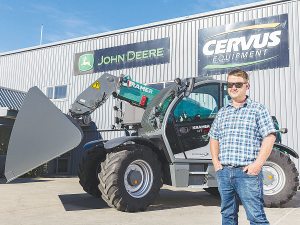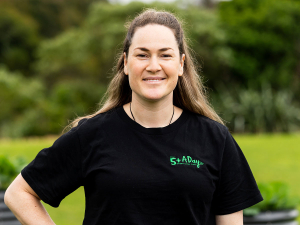Hastings-based Kleer Contractors provides 24-hour machine work and labour for a local food processing plant.
Founded in 1999 by Kenneth Davidson’s father, the original business focused on drain cleaning and liquid waste removal, before Kenneth took over running things about 20 years ago.
Today, the business operates 19 trucks, employs 15 permanent staff and offers services that include bulk cartage using tankers and tippers for the stock-feed industry. It also does waste and food bio-product disposal in the wine and cider sectors. Clients range from individuals and small businesses, to government and corporate enterprises.
During the last eight years, the operation has supplied a telehandler and driver to a Hastings canned food factory. This is fitted with a 5-metre by 1.5-metre, custom-built blade to push corn that is tipped onto a pad, onto a conveyor belt for processing in the 24/7 operation.
After seeing an announcement that Cervus Equipment would exclusively supply the German-built Kramer telehandler line up, Davidson was drawn to the KT447 model that offers for 17m reach and a 4.4 tonne lift capacity.
A quick test drive gave him the impression that the Kramer was solid where it counts. The machine had oversized steel sections, heavy-duty components and high levels of workmanship and Davison was confident that his staff, who put in long shifts, would be safe and comfortable.
He placed an order and took immediate delivery.
“Having clocked up around 1,000 hours, I would recommend the Kramer KT447. We have really found it to be a superior machine,” he says. “The workers are running it night and day and although we had no real issues with our last machine, they describe the difference between the two as ‘chalk and cheese’.”
Given the high hours worked, operator comfort is paramount; so the ergonomic design of the main joystick makes for easy movements. Everything is at the operator’s fingertips, as it’s mounted to the seat and is always consistent – even if the seat is rotated into different positions.”
Davidson reports a noticeable improvement in the smooth transition between steering modes compared to the last telehandler, alongside its ability to put power to all four wheels, via the hydrostatic transmission, without generating wheel slip or tyre hop.
“Forward and reverse settings are all electronic and require the brake to be on when they are engaged,” he says. “Meaning you can’t inadvertently knock a switch and select a direction change by mistake.”
Another safety feature sees, if for any reason the operator leaves the cab, the machine revert to neutral and apply the brakes – meaning the machine can’t move without the operator being present. Currently being used full-time in the food processing factory, Davidson is keen to explore the performance of the Kramer in other areas of his business – including hay and fodder production. He hopes the machine’s ability to travel well over rougher ground, will help increase productivity in this part of the business.



















